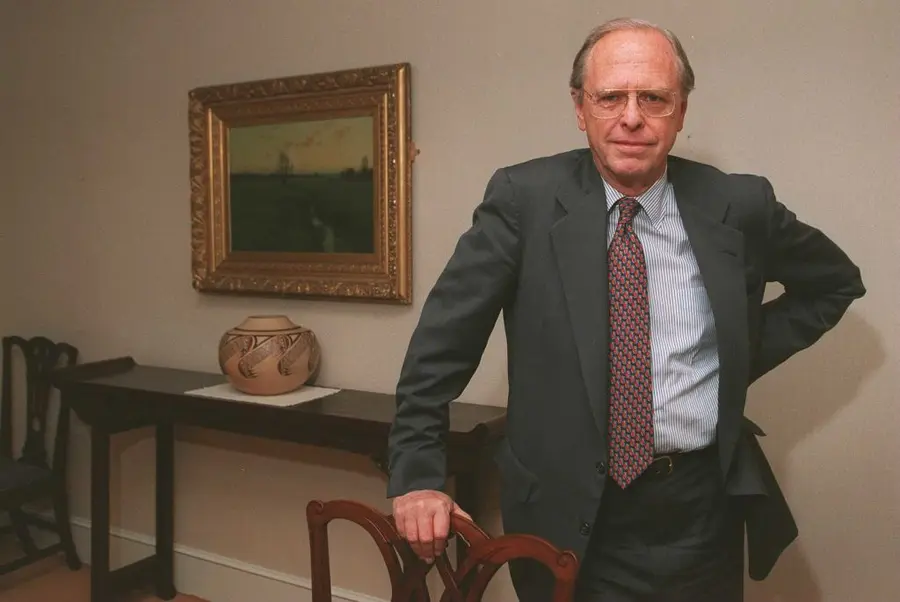What was Edward Johnson's net worth?
Edward Johnson was an American investor and businessman who had a net worth of $9 billion at the time of his death in 2022. Edward Johnson III was best known for transforming Fidelity Investments into one of the largest and most influential financial institutions in the world. As chairman and CEO of the company from the mid-1970s through the early 2010s, Johnson presided over its rapid expansion into retirement services, brokerage, and international markets, building Fidelity into a household name. He was widely regarded as a visionary leader in mutual fund investing and was instrumental in democratizing access to sophisticated financial products for millions of Americans.
Early Life
Edward Crosby Johnson III was born into wealth and privilege, the son of Edward C. Johnson II, who founded Fidelity Management & Research in 1946. Raised in the Boston area, Ned was educated at elite private schools before attending Harvard College, where he earned a degree in 1954. After serving a stint in the U.S. Army, Johnson returned to Boston and joined the family firm in 1957 as a research analyst.
Though Fidelity had grown steadily under his father's leadership, it was still a relatively modest investment company in the late 1950s. Johnson spent the next two decades learning the business from the ground up, working in research and portfolio management before moving into executive leadership roles.
Rise at Fidelity
In 1972, Johnson became president of Fidelity, and in 1977, he officially succeeded his father as chairman and CEO. His timing coincided with a period of rapid change in the U.S. financial system. Under Ned's leadership, Fidelity capitalized on these shifts by innovating aggressively in product offerings, customer service, and technology.
One of his most influential decisions came in the late 1970s, when Fidelity launched the Magellan Fund under the management of Peter Lynch. The fund's explosive performance during the 1980s made it one of the most successful mutual funds in history and turned Fidelity into a retail investment powerhouse. Johnson emphasized active management and performance-driven strategies, attracting a new generation of investors.
He was also one of the first executives in the mutual fund industry to embrace 401(k) retirement plans, helping drive the explosion of defined-contribution savings in the 1980s and 1990s. Under Johnson, Fidelity expanded far beyond mutual funds into discount brokerage, institutional asset management, personal financial services, and global operations.

(Photo by John Bohn/The Boston Globe via Getty Images)
Innovation and Leadership Style
Ned Johnson was known as a detail-oriented, hands-on leader who prized performance, secrecy, and loyalty. He resisted calls to take Fidelity public, keeping the company privately held and under family control—an uncommon stance in an increasingly transparent and shareholder-driven industry. This allowed Fidelity to invest heavily in long-term infrastructure, including in-house technology platforms and customer support operations.
He was also an early proponent of automating financial services. Johnson oversaw the development of Fidelity's sophisticated back-end systems and its early adoption of internet-based account management. These investments helped Fidelity scale rapidly without sacrificing service quality, even as its customer base ballooned into the tens of millions.
Despite his introverted nature, Johnson held enormous sway in the world of finance and was regarded as a shrewd, visionary executive who anticipated industry trends long before his peers. He also helped professionalize the fund management industry by emphasizing research, transparency, and client education.
Succession and Retirement
Ned Johnson began passing the torch to his daughter, Abigail Johnson, in the 2000s. She joined Fidelity in 1988 and worked her way up through the company, eventually becoming president of Fidelity Financial Services in 2012. In 2014, she succeeded him as CEO, and in 2016 she was named chair of the board. Ned officially retired that same year, capping nearly 60 years at the firm.
Even after stepping back, Johnson remained a major shareholder and behind-the-scenes figure at Fidelity. He retained the honorary title of chairman emeritus and continued to serve as an advisor and mentor to senior leadership.
Personal Life and Legacy
Edward Johnson III was known for his intense privacy and rarely spoke to the press. He was an avid collector of American art and a generous philanthropist, particularly to Boston-area institutions. He supported numerous causes through the family's charitable foundation, including education, the arts, and medical research.
He was married to Elizabeth "Betsey" Johnson until her death in 2016. The couple had three children: Abigail, Elizabeth, and Edward IV. Abigail, his eldest daughter, inherited his role at Fidelity and is widely credited with continuing his legacy of innovation and stewardship.
Ned Johnson died on March 23, 2022, at the age of 91. Tributes from across the financial world recognized him as one of the most influential figures in modern investing—a man who helped bring professional money management to the masses and forever changed the way Americans save and invest.
His legacy lives on through Fidelity's enduring dominance and the continued leadership of the Johnson family, making Edward Johnson III a towering figure in the history of American finance.
/2010/09/edward-johnson.jpg)
/2019/01/peter-lynch.jpg)
/2009/09/otto2.jpg)
/2010/07/John-Bogle.jpg)
/2013/05/rahmi.jpg)
/2020/06/taylor.png)
:strip_exif()/2015/09/GettyImages-476575299.jpg)
/2009/09/Brad-Pitt.jpg)
/2020/02/Angelina-Jolie.png)
/2018/03/GettyImages-821622848.jpg)
/2020/04/Megan-Fox.jpg)
/2020/01/lopez3.jpg)
/2019/10/denzel-washington-1.jpg)
/2019/04/rr.jpg)
/2017/02/GettyImages-528215436.jpg)
/2009/11/George-Clooney.jpg)
/2009/09/Jennifer-Aniston.jpg)
/2010/09/edward-johnson.jpg)
/2019/01/peter-lynch.jpg)
/2016/11/GettyImages-77333677-e1513492648336.jpg)
/2020/10/GettyImages-1093432706.jpg)
/2009/09/otto2.jpg)
/2012/06/Donald-Newhouse.png)
/2010/01/michael2.jpg)
/2019/11/GettyImages-1094653148.jpg)
/2009/09/Cristiano-Ronaldo.jpg)
:strip_exif()/2009/09/P-Diddy.jpg)